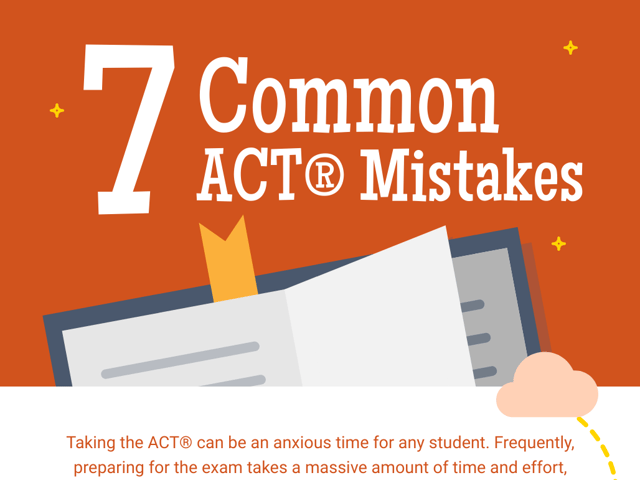
Seven Common ACT Mistakes
Taking the ACT can be a nerve-wracking experience, even for the most academically adept students. While the test evaluates core academic knowledge, it also challenges test-takers on strategy, time management, and more. Even those well-prepared can find themselves falling into common pitfalls that might stand between them and their desired score. As you venture into the intricacies of ACT preparation and strategies, recognizing these frequent missteps can be instrumental. Whether you’re attempting the ACT for the first time or aiming to enhance an already decent score, understanding these common errors is a pivotal step in your test-taking journey.
1. Not Managing Time Efficiently
Proper time management is a cornerstone of success on the ACT. With various sections like English, Math, Reading, Science, and an optional Writing test, the ACT provides a limited amount of time for each. If not navigated correctly, this can be a significant pitfall for many test-takers.
For instance, in the Reading section, test-takers are allotted 35 minutes to tackle 40 questions, equating to less than a minute per question. If a student lingers on a complex passage for 5 minutes, they compromise the time designated for subsequent questions. Such delays could result in rushing later passages and possibly overlooking simpler questions. To counteract this, it’s advantageous to segment your time. In the case of the Reading section, aiming for 8-9 minutes per passage — encompassing both reading and answering questions — can be a practical guideline. Incorporating regular timed ACT practice tests will further hone this skill, making it almost second nature on test day.
| ACT Sections | Number of Questions | Time Limit (Minutes) |
|---|---|---|
| English | 75 | 45 |
| Math | 60 | 60 |
| Reading | 40 | 35 |
| Science | 40 | 35 |
| Writing (optional) | 1 essay | 40 |
2. Overthinking Questions
The ACT is structured to gauge college readiness, not to ensnare students in elaborate tricks. Consequently, often the direct answer is the right one. While meticulous reading is crucial, overanalyzing can be detrimental.
Take a typical math problem, for example, where the task might be to determine the value of x in a specific equation. A test-taker, instead of straightforwardly solving for x, might get sidetracked by trying to recall an intricate formula they learned recently. Such detours not only deplete time but also augment the risk of mistakes. A proactive approach entails treating each question as if a simple solution is at hand. If a question proves to be perplexing, it’s wise to mark it and progress to the next one, but keep in mind that revisiting is limited to questions within the active section. That means once you’ve completed the Math section and moved onto Reading, you won’t be able to revisit any Math questions.
3. Not Reviewing Wrong Answers
In the quest to achieve a high ACT score, it’s easy to become fixated on the number of correct answers. While celebrating your strengths and achievements is important, it’s equally crucial to understand your mistakes. Ignoring or glossing over incorrect answers deprives you of valuable learning opportunities.
For instance, suppose you consistently miss questions related to a particular grammar rule in the English section or a specific type of math problem. By reviewing your wrong answers, you can pinpoint these consistent errors and dedicate more time to understanding and mastering those areas. Additionally, sometimes mistakes arise not from a lack of knowledge but from misreading questions or making simple calculation errors. Recognizing these patterns can help you develop strategies to avoid such mistakes in the future.
In short, every wrong answer carries with it a lesson. Embracing these lessons can make the difference between a good score and an exceptional one.
4. Neglecting to Practice with Quality ACT Practice Materials
The journey to achieving a high ACT score starts with the right preparation tools. Quality resources, including those provided by reputable test prep companies and official ACT practice tests, are invaluable assets in this journey. While there are numerous unofficial materials available, not all are created equal. Some might give you a glimpse into the test, but they might fall short in truly emulating the test’s intricacies.
Quality resources from trusted test prep providers are designed to match the content, format, and difficulty level of the ACT. They go through rigorous checks and are often updated based on the latest ACT trends. When combined with official ACT practice tests, which are the gold standard in terms of reflecting the actual test, you give yourself a holistic and effective preparation experience.
Beware of the pitfall of being lulled into a false sense of security by unofficial or subpar resources. While these might seem easier and boost your confidence, they can also lead to an unexpected reality check on test day. To ensure you are truly prepared, it’s paramount to blend your study regimen with both top-tier preparatory materials from respected sources and official ACT tests. This balanced approach not only sharpens your skills but also gives you a realistic assessment of your readiness.
5. Skipping Questions Without Guessing
Every point counts when taking the ACT, and leaving a question unanswered guarantees you zero points for that item. The ACT does not penalize test-takers for incorrect answers, which means that guessing, even if it’s a complete shot in the dark, always gives you a better chance than leaving it blank.
For instance, if you encounter a particularly challenging question, you might spend minutes wrestling with it only to leave it unanswered. This approach not only wastes precious time but also robs you of potential points. Instead, making an educated guess based on the information provided, or even selecting an answer at random when stumped, can boost your score. After all, a 25% chance (given four answer choices) of getting it right is infinitely better than a guaranteed 0%.
6. Neglecting Certain Subjects During Preparation
The ACT tests multiple subjects, and it’s a natural instinct to gravitate towards preparing more for subjects we find challenging or unfamiliar. However, this can be a double-edged sword. While it’s important to strengthen your weaknesses, ignoring or sidelining subjects you’re confident in can lead to unexpected missteps on test day.
Consider a student who excels in math but decides to prioritize reading and science during their study sessions. While their focus on weaker subjects might yield improvement, they might also encounter unexpected math questions they haven’t prepared for, leading to lost points. It’s essential to strike a balance and allocate time for all subjects, ensuring a comprehensive review and well-rounded preparation.
7. Failing to Plan for Test Day
The actual content of the ACT is just one facet of the test-taking experience. The logistics surrounding the exam play a significant role in your performance. Overlooking simple yet crucial details, such as what ID to bring, can cause unnecessary stress or even prevent you from taking the test.
Imagine arriving at the test center only to realize you forgot a necessary ID or your calculator. Such oversights can throw off your entire mindset, even before the test begins. Additionally, lack of sleep or inadequate nutrition can hinder focus and cognitive function. It’s essential to consider the holistic test-day experience: ensure you have all required materials, get a restful night’s sleep, consume a balanced breakfast, and aim to arrive with time to spare. A calm and prepared mind is as important as the knowledge you’ve accrued during your study sessions.
Navigating the ACT with Confidence
The ACT is more than just a test; it’s an opportunity to showcase years of academic prowess and preparation. By identifying and circumventing these common mistakes, students can optimize their performance and approach the test with a clearer, more strategic mindset. As with any challenge, knowledge is power. Being aware of potential pitfalls and actively working to avoid them can drastically impact your final score. Remember, every student’s journey is unique, so continuously tailor your strategies to fit your needs and strengths. With dedication, awareness, and practice, you can face the ACT with confidence and achieve your academic goals.

Keep Reading

ACT Blog
Essay Writing Practice and Prompts for the ACT
The ACT writing test is an optional exam, and is not always given as pa…

ACT Blog
How to Do Well on the ACT Essay
Understanding the ACT Essay Before diving into strategies to excel, it…

ACT Blog
How to Study for the ACT in One Week
Getting ready for American College Testing (the ACT) can be a source of…